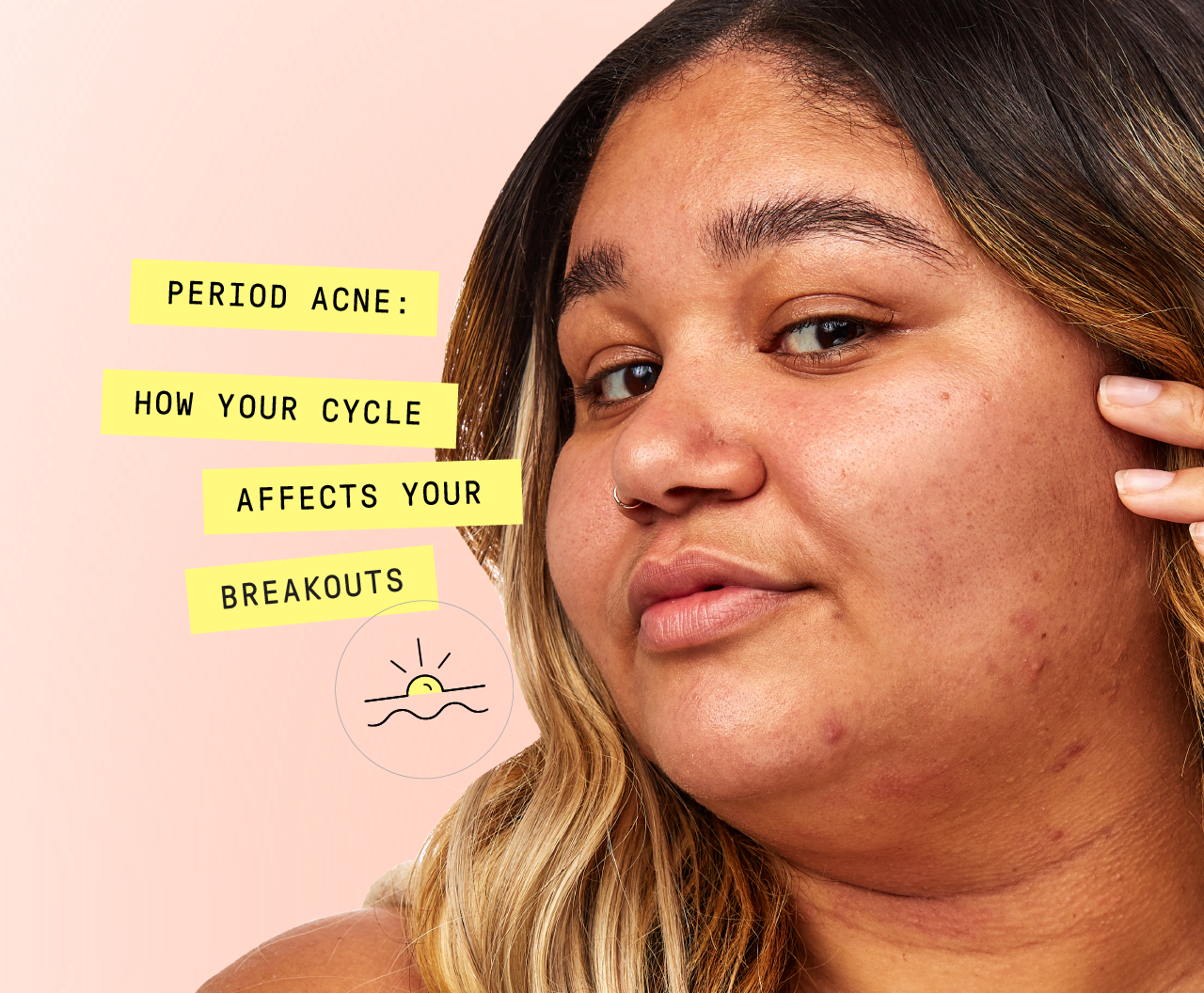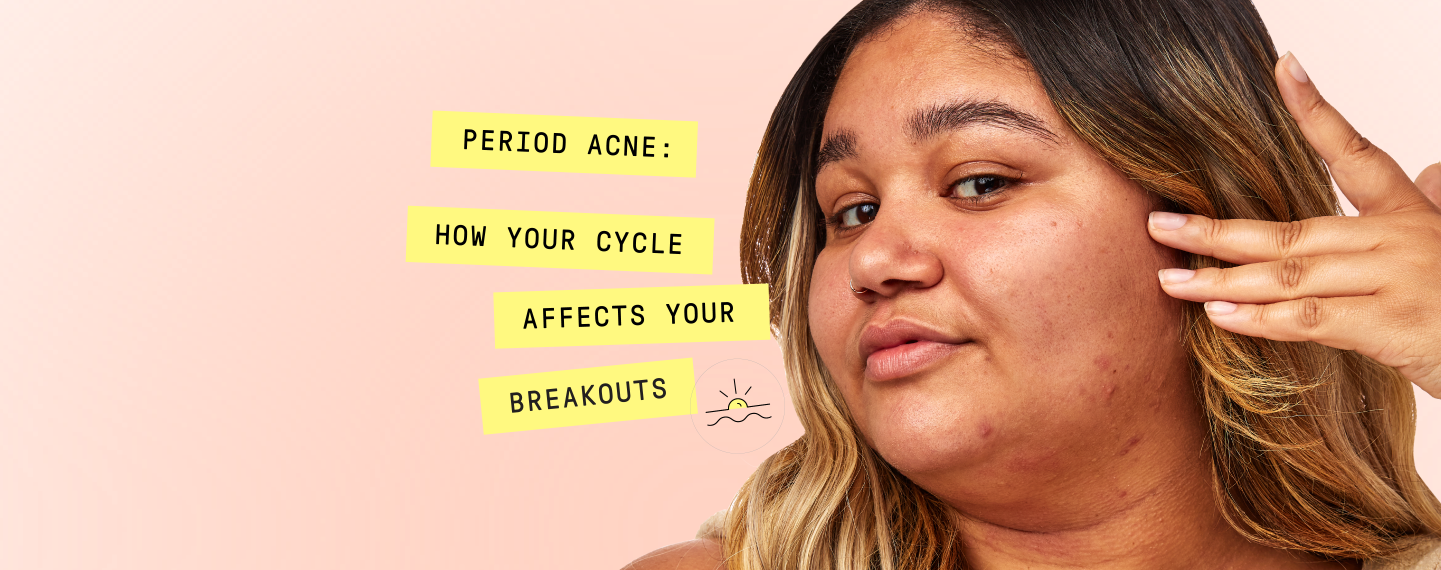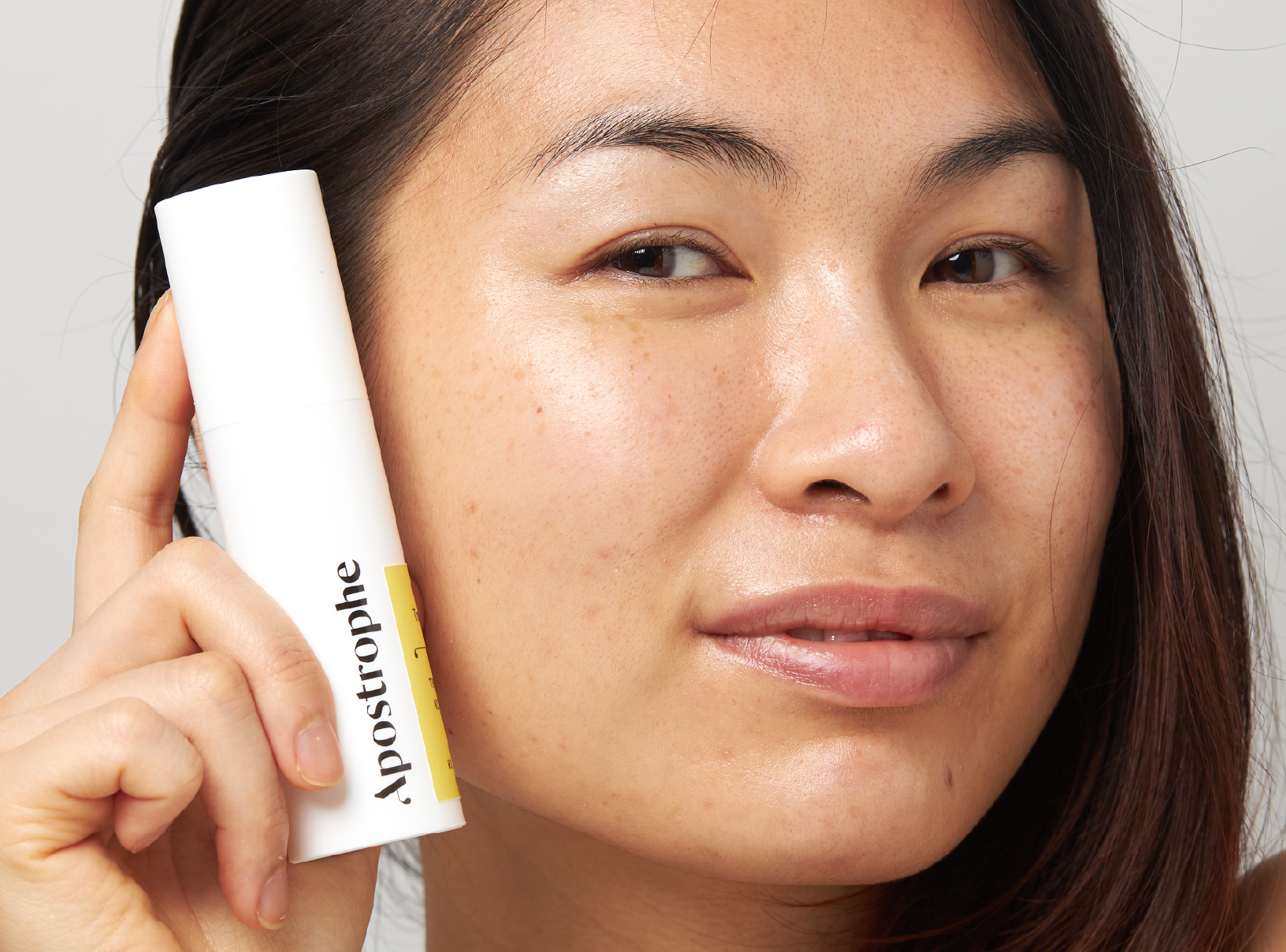Education
Period Acne: How Your Cycle Affects Your Breakouts


SHARE
Education
Period Acne: How Your Cycle Affects Your Breakouts
Medically reviewed by Aimee Paik, MD
Written by Annie Lam
Last updated 11/1/2024
Have you noticed that your breakouts tend to flare up around your menstrual cycle? Some people call this "period acne" or "menstrual acne" because of this pattern. Today we'll be talking about how your period affects breakouts and how to treat them.
How does your period affect your acne?
The hormones in your body (estrogen and progesterone) affect your menstrual cycle. During your cycle, which typically lasts 28 days, your hormone levels can fluctuate. These hormonal changes tend to be the cause of cramps, moodiness, and period acne.
A hormonal imbalance can lead to an increase of androgens, which are male sex hormones (like testosterone). An increase of androgens can lead to an overactive sebaceous gland and abnormal shedding of skin cells above the hair follicle. This increased oil production can lead to clogged pores and is the perfect environment for acne causing bacteria (Cutibacterium acnes) to grow.
Hormones play a role in all types of acne, but derms tend to use the term hormonal acne to refer to a type of acne breakout that affects adult women during their menstrual period.
What does hormonal acne look like?
Hormonal acne (sometimes called adult acne) is often found on the jawline and chin. This type of acne is typically caused by a hormonal fluctuation and can flare up during or around your period, pregnancy, or menopause. Certain diseases like polycystic ovary syndrome (PCOS) can increase the likelihood of hormonal acne.
Hormonal acne can be seen in a variety of different acne severities, from mild acne to severe acne. Everyone's skin is different, so getting customized treatment for your hormonal acne can help ensure you're effectively treating your breakouts.
How do you treat period acne?
Now that you know how your period can affect your acne, let's talk about treatment options for a stubborn hormonal breakout. There are many ingredients that dermatologists recommend for hormonal acne, so we'll be breaking them down by topical and oral treatments.
Topical acne treatments
Depending on the severity of your hormonal acne, you may be able to target your breakouts with topical treatments alone.
Salicylic acid: An over-the-counter treatment for acne that helps to unclog pores by breaking down excess oil and dead skin cells. A great option for very mild breakouts, but not the best option for more severe acne.
Benzoyl peroxide: Another over-the-counter treatment that helps to reduce c. acnes bacteria and calm inflammation. This can help treat mild inflammatory acne, but is not as effective as prescription treatments for moderate to severe breakouts.
Tretinoin: A prescription-strength vitamin A derivative that helps to unclog pores and resurface the skin to treat and prevent breakouts. A derm-favorite for treating acne, signs of aging, and hyperpigmentation.
Azelaic acid: A gentle treatment that has anti bacterial and anti inflammatory properties. A great option for sensitive and acne prone skin. It's one of the few acne treatments that is safe to use during pregnancy.
Topical spironolactone: A topical acne medication that treats the hormonal causes of acne at the skin level. This can be used by anyone, regardless of sensitivity to oral medications.
Oral acne medications
Your dermatology provider may prescribe oral medications alongside topical treatments to effectively treat your breakouts.
Spironolactone: Oral spironolactone is one of the best treatments for period acne. It reduces testosterone levels and targets hormonal breakouts at the source. Oral and topical spironolactone can also be used together to treat hormonal acne from the inside and out. Spironolactone should not be used by pregnant women or those trying to conceive because of the potential risk of birth defects.
Birth control pill: Hormonal birth control options that combine estrogen and progesterone can also help to reduce testosterone levels. You can use birth control pills alongside spironolactone to prevent pregnancy and help with irregular periods.
Oral antibiotics: Oral medications like doxycycline andminocycline help to calm inflammatory lesions and target acne causing bacteria (cutibacterium acnes).
Isotretinoin (Accutane): An oral retinoid that is typically used to treat severe, cystic acne.
Get expert treatment for your skin
Wondering what the best treatment is for your period breakouts? We recommend checking in with a dermatologist or healthcare provider for customized treatment. They have the expertise to prescribe the best skin treatments for your skin and concerns.
To get started, you'll complete a virtual consultation form where you can describe your skin concerns and acne symptoms. An expert dermatology provider will create a treatment plan customized to your unique skin.
Take the confusion out of acne treatment and get started on your journey to healthy skin today.
Sources:
https://www.healthshots.com/beauty/skin-care/a-dermatologist-shares-the-ultimate-guide-to-dealing-with-period-acne/
https://flo.health/menstrual-cycle/health/period/period-acne
Like what you just read? Sign up for our email list to get the scoop on skincare science delivered straight to your inbox.

Deep Dives
A dermatologist shares his thoughts on the recent studies about benzoyl peroxide and benzene.
Read More
Education
What is milia?
What is milia? Today, we’re jumping into one type of bump that you may have heard about most commonly in infants — milia.
Read More
Education
Best moisturizer for acne-prone skin
If you have combination acne-prone skin, figuring out which moisturizer is best for your skin might be tough. In this guide, we break down the best moisturizer for combination, acne-prone skin.
Read More
